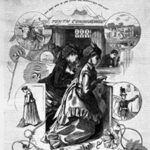Words That Changed the World: The Meaning of the Ten Commandments
A podcast series by Rabbi Meir Soloveichik
Click here to listen to the series.
John Adams once reflected that “the Hebrews have done more to civilize man than any other nation.” Why? Because biblical monotheism, and the moral code at its heart—the Ten Commandments—formed Western civilization more than anything else.
In “Words That Changed the World,” Rabbi Dr. Meir Y. Soloveichik explores the Ten Commandments as you’ve never understood them before. Over five engrossing episodes, each examining two commandments, discover how the Decalogue reveals the deepest truths about God, man, morality, family, justice, and the very meaning of civilization.
You can listen to every lecture right on this website below. Or if you prefer, you can subscribe to the course as a podcast on Apple Podcasts (link below). Lectures are 45-50 minutes, covering two commandments each.
Episode 1: The First and Second Commandments

How Do We Know God? The First Commandment
Judah Halevi pondered why the one true God revealed Himself not merely as Creator of the Universe, but as the God of Abraham Who took Israel out of Egypt. What does this tell us about Judaism’s view of God—and the link between the particular and the universal?

Judaism vs. Idolatry: The Second Commandment
Judaism’s confrontation with idolatry is far from ancient history. Here Rabbi Soloveichik reveals what paganism truly is and how its spirit is returning in modern forms.
Episode 2: The Third and Fourth Commandments

Who Is God? The Third Commandment and the Name of the Lord
What does it mean that the Creator has a personal and ineffable name? Rabbi Soloveichik explores how the sanctity of God’s name illuminates the biblical vision of divinity and reverence.

The Most Misunderstood Day: Sabbath and the Fourth Commandment
Shabbat introduced the idea of a day of rest to the world—but what is its real purpose? Discover how the Sabbath reshapes our understanding of work, holiness, and human dignity.
Episode 3: The Fifth and Sixth Commandments

God, Father, and Mother: The Partnership That Defines the Jewish Family
Why is honoring one’s parents listed alongside commandments about God? Judaism sees family as a sacred partnership in creation and as the foundation of faith itself.

Human Life and the Divine Life: The Sixth Commandment
“All humans are created in the image of God”—but what does that mean? The commandment not to murder offers a moral insight that shaped the West and needs to be recovered today.
Episode 4: The Seventh and Eighth Commandments

Family and the Seventh Commandment
Adultery is not only a private failing—it strikes at the covenantal heart of marriage. This commandment shows how Jewish tradition links faith in family to faith in God.

Life, Liberty, and Judaism: The Eighth Commandment and the Birth of Human Rights
“Thou shalt not steal.” Just two words in Hebrew—but within them lies a revolutionary idea: that liberty and property are moral concepts, and that justice begins with respecting what belongs to others.
Episode 5: The Ninth and Tenth Commandments

When It Displeases the Court: Truth, Testimony, and the Ninth Commandment
What does it mean to speak “the whole truth, and nothing but the truth”? The Torah’s prohibition on false testimony is a deeper call to honor truth itself in all spheres of life.

The Green-Eyed Monster: Envy and the End of the Decalogue
Why does the Ten Commandments end with “Thou shalt not covet”? This surprising finale unlocks the purpose of the entire code—and shows how civilization depends on them.
